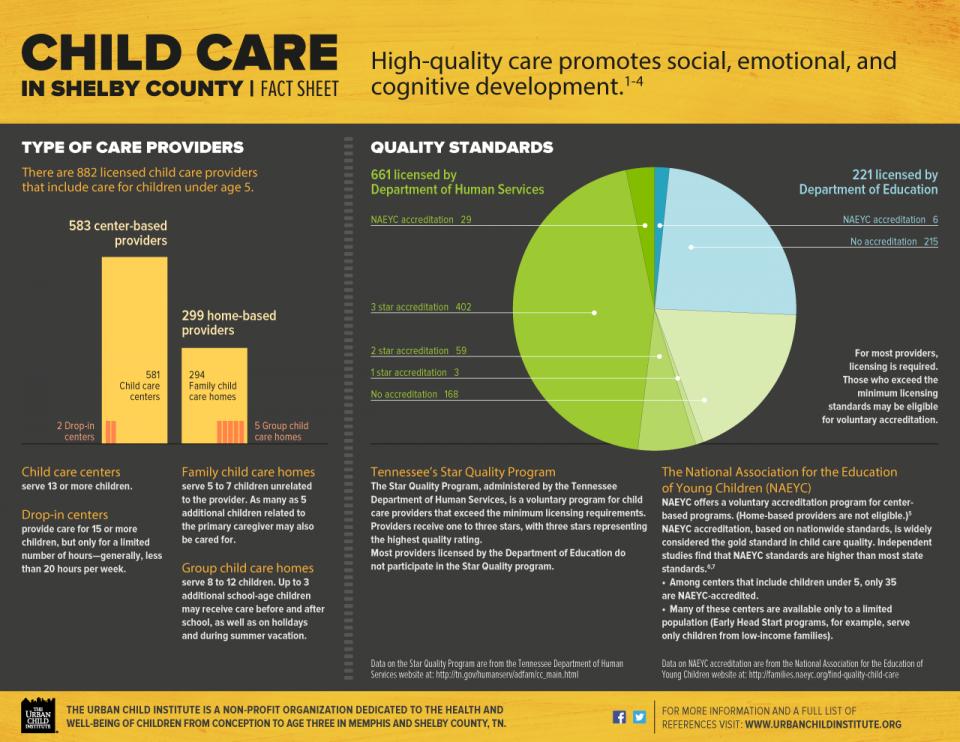-
Embed this graphic on your web site:
<a title="View this infographic on The Urban Child Institute's web site" href="http://www.urbanchildinstitute.org/articles/infographics/pre-k-matters">
<img src="http://857084.6bgr9ubv.asia/sites/all/files/UCI_ChildCare_ForWeb.png" alt="Urban Child Institute Infographic: Infographic: Child Care In Shelby County">
</a>High-quality care promotes social, emotional, and cognitive development.1-4
Type of Care Providers
There are 882 licensed child care providers that include care for children under age 5.
- 583 center-based providers:
- 581 Child care centers
- 2 Drop-in centers
- 299 home-based providers:
- 294 Family child care homes
- 5 Group child care homes
Child care centers serve 13 or more children.
Drop-in centers provide care for 15 or more children, but only for a limited number of hours—generally, less than 20 hours per week.
Family child care homes serve 5 to 7 children unrelated to the provider. As many as 5 additional children related to the primary caregiver may also be cared for.
Group child care homes serve 8 to 12 children. Up to 3 additional school-age children may receive care before and after school, as well as on holidays and during summer vacation.
Quality Standards
For most providers, licensing is required. Those who exceed the minimum licensing standards may be eligible for voluntary accreditation.
- 661 licensed by Department of Human Services
- NAEYC accreditation: 29
- 3 star accreditation: 402
- 2 star accreditation: 59
- 1 star accreditation: 3
- No accreditation: 168
- 221 licensed by Department of Education
- NAEYC accreditation: 6
- No accreditation: 215
Tennessee’s Star Quality Program
The Star Quality Program, administered by the Tennessee Department of Human Services, is a voluntary program for child care providers that exceed the minimum licensing requirements. Providers receive one to three stars, with three stars representing the highest quality rating. Most providers licensed by the Department of Education do not participate in the Star Quality program.
Data on the Star Quality Program are from the Tennessee Department of Human Services website at: http://tn.gov/humanserv/adfam/cc_main.html
The National Association for the Education of Young Children (NAEYC)
NAEYC offers a voluntary accreditation program for center-based programs. (Home-based providers are not eligible.)5
NAEYC accreditation, based on nationwide standards, is widely considered the gold standard in child care quality. Independent studies find that NAEYC standards are higher than most state standards.6,7
- Among centers that include children under 5, only 35 are NAEYC-accredited.
- Many of these centers are available only to a limited population (Early Head Start programs, for example, serve only children from low-income families).
Data on NAEYC accreditation are from the National Association for the Education of Young Children website at: http://families.naeyc.org/find-quality-child-care
References:- Belsky J, et al. Are there long-term effects of early child care? Child Development. 2007; 78(2): 681–701.
- Burchinal MR et al. Quality of Center Child Care and Infant Cognitive and Language Development. Child Development. 1996; 67(2): 606-20.
- NICHD Early Child Care Research Network. Child care effect sizes for the NICHD Study of Early Child Care and Youth Development. American Psychologist. 2006; 61(2): 99-116.
- Peisner-Feinberg ES, et al. The relation of preschool child-care quality to children’s cognitive and social developmental trajectories through second grade. Child Development. 2001; 72(5): 1534-1553.
- National Association for the Education of Young Children. 2013. NAEYC Eligibility Requirements. Available at:
- http://www.naeyc.org/academy/pursuing/eligibilityreq
- Helburn SZ, Bergmann BR. America’s Child Care Problem: The Way Out. New York: Macmillan; 2003.
- Whitebook M, SakaiL. By a Thread: How Child Care Centers Hold on to Teachers, how Teachers Build Lasting Careers. Kalamazoo, MI: W.E. Upjohn Institute for Employment Research; 2004.
- 583 center-based providers:
